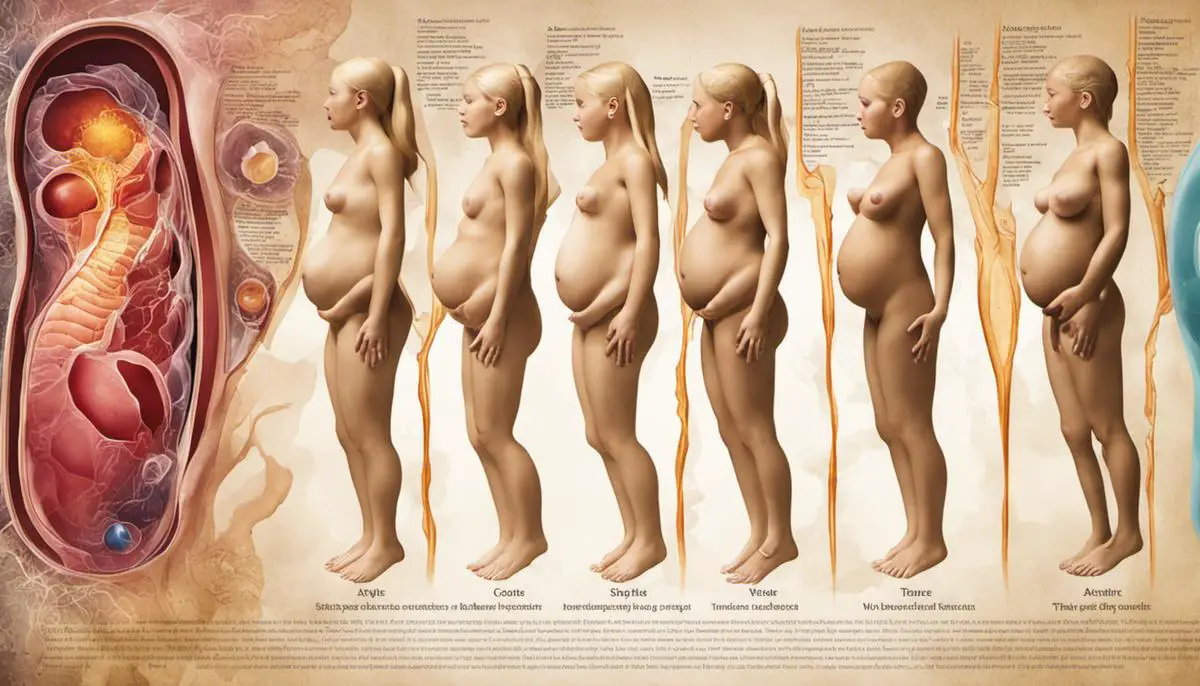Vanishing Twin Syndrome (VTS) is a complex medical phenomenon carrying profound psychological impact. Drawing its name from the mysterious disappearance of one twin during early pregnancy, this syndrome leaves parents grappling with a mixture of conflicting emotions. This is not only a medical circumstance but an emotional rollercoaster about an unmet expectation of two babies that goes beyond statistical prevalence and medical explanations. This article attempts to provide an understanding of VTS, explores the emotional fallout on parents and the surviving twin, and emphasizes the critical role of counseling and support to navigate this overwhelming experience.
Understanding Vanishing Twin Syndrome
Understanding Vanishing Twin Syndrome
Vanishing Twin Syndrome (VTS) is a term used to define a situation where a twin or multiple disappears in the uterus during pregnancy. More specifically, this disappearance is the result of a miscarriage of one twin or multiple. The fetal tissue of the vanished twin is absorbed either by the other twin, the mother, or the placenta. Hence, this entity is named “vanishing,” as there is no visible trace at birth of the other twin.
The advent of ultrasound technology has made it possible to diagnose VTS, which usually occurs in the first trimester. Studies suggest that VTS may happen in between 21% to 30% of multifetal pregnancies. However, it’s not limited to just twin pregnancies and can occur in higher-order multiples, such as triplets or quadruplets.
Causes of Vanishing Twin Syndrome
The exact cause of VTS is unknown and can vary. It’s often caused by chromosomal abnormalities or improper cord implantation. Other potential contributing factors include defects in the reproductive organs or blood clotting disorders. Despite the fairly high occurrence of VTS, the survivors of this syndrome don’t appear to be at increased risk for birth defects or health issues compared to other singleton pregnancies.
Emotional Impact of Vanishing Twin Syndrome
The emotional impact of VTS is significant and often overlooked as the focus generally remains on the physical health of the surviving twin. Patients may experience grief over the loss of the vanished twin, even if it was early in pregnancy. This grief may be exacerbated if the vanishing twin was identified via early ultrasound, at which point the parent(s) may have started to bond with the idea of having more than one child.
According to the American Pregnancy Association, common reactions include guilt, a sense of loss, and feelings of confusion. There may also be a fear for the health of the surviving twin. These emotions can be complicated by the concurrent joy for the surviving twin, leading to a confusing mix of contrasting emotions. Each individual may process this experience differently, and factors such as the time of the loss, whether the pregnancy was planned, and personal beliefs about when life begins can affect how the loss is processed emotionally.
Dealing with the Emotional Impact of Vanishing Twin Syndrome
The way people deal with Vanishing Twin Syndrome (VTS) differs greatly according to their individual emotional strength and existing support structures. It’s imperative to understand that experiencing a sense of loss is completely normal, and it’s essential to allow yourself room and time for grief. Engaging in professional psychological support or joining support groups could provide substantial assistance for those grappling with the emotional aspects of VTS. Many find it helpful to commemorate the life of the ‘vanished’ twin, through practices such as naming them or observing their would-be birthday as a day of remembrance.
Equally, it’s key to stress to parents that VTS is not attributable to any action or inaction on their part. It’s a naturally occurring phenomenon for which medical intervention is typically not required as the remaining fetus is usually unaffected. A regular schedule of prenatal care checks can help ensure the health of the surviving twin for the rest of the gestation period.

Photo by gmalhotra on Unsplash
Identifying the Emotional Impact of VTS on Parents
Understanding the Emotional Ramifications of Vanishing Twin Syndrome
Vanishing Twin Syndrome is a phenomenon occurring when one multiple in a pregnancy fails to develop and is absorbed by the surviving twin, other multiples, the placenta, or even the mother. As a result, it appears as if the twin has ‘vanished’, generally during the first trimester. The emotional aftermath, for parents and their extended family members, of experiencing VTS can be extensive and multifaceted, adding an extra layer of complexity to the grieving process.
Immediate Emotional Response
The immediate emotional reaction of parents to VTS can vary from shock, grief, to guilt. It’s a baffling and distressing experience as couples struggle to comprehend the occurrence. Sometimes feelings of depression, anxiety, and post-traumatic stress disorder can occur. Even if they have a surviving baby, the loss of a twin is a significant loss that parents should be allowed to grieve.
Parental Grief and Coping Strategies
Parents who go through VTS often experience a unique form of grief. Knowing there was a twin that didn’t make it to birth can cause parents to feel an intense sense of longing and sadness. Some parents may feel misunderstood as others may not view their loss as significant, especially if there is a surviving twin. Grief associated with VTS can be complex and confusing.
Recognizing grief’s validity in bereaved parents of VTS is an essential initial step. Mental health professionals recommend speaking about the loss, validating feelings of sadness, seeking support groups with others who have experienced a similar loss, and individual or couples therapy as effective coping strategies.
A Lack of Societal Understanding
Because VTS generally occurs in the early weeks of pregnancy and is often identified through ultrasound, those outside of the immediate family may not fully grasp the depth of the parents’ loss. This lack of societal understanding can lead to feelings of isolation for the parents, contributing to their grief and complicating their emotional recovery.
The Role of Healthcare Providers
Healthcare providers can play a crucial role in alleviating the emotional trauma of the affected parents. By providing structured, compassionate, and specialized care during prenatal visits, they can help parents navigate their grief. This involves informing parents about VTS, validating their loss, and offering resources such as counseling and support groups.
Parent Anecdotes
Personal stories of parents who’ve experienced VTS further illuminate the emotional toll. One mother shared she felt mixed feelings of joy for the surviving twin and despair for the one lost. She found herself mourning what could have been – a life without her vanished twin. Another father told of the anxiety experienced in subsequent pregnancies, the fears of VTS repeating itself being all-consuming.
Expert Opinions from Psychologists or Counselors
Counselors and psychologists recommend open conversations about grief and loss, saying that these are effective healing tools. Other suggested strategies include journaling feelings, seeking support in online communities, remembering the lost twin in personal ways, and exploring grief counseling options. Psychological care helps parents come to terms with their loss over time, moving towards acceptance and healing.
Long-term Emotional Impacts
The emotional impact of VTS doesn’t end at birth. Parents may find themselves thinking about the missing twin on significant dates, such as the children’s birthdays and holidays. If the surviving child later learns they were a twin, there may be additional layers of emotional impact to navigate. Parents may find a recurrence of grief during these periods, which is normal. Therapeutic strategies should be sought as needed.
The emotional toll of Vanishing Twin Syndrome (VTS) on parents is significant, carrying a profound and multi-layered impact. Recognizing the inherent grief tied to this condition and implementing coping mechanisms is the first step towards parents traversing through this complicated emotional journey.

Emotional Impact of VTS on Surviving Twin
Digging Deeper into Vanishing Twin Syndrome
VTS is an occurrence during early pregnancy, where one of the multiples ‘vanishes’ within the uterus. This event transpires when the fetal tissue is absorbed by either its twin, multiple, the placenta, or even the mother. This scenario often appears as if the fetus has mysteriously ‘disappeared.’ This surprising medical phenomenon, primarily detected through ultrasound technology, tends to leave no physical trace besides the missing fetus. While it might affect the surviving twin physically, it’s the silent emotional repercussions that might leave a lasting impact on the survivor’s mental well-being.
The Psychological Phenomenon: Twinless Twin Syndrome
The psychological effects of VTS on the surviving twin can be challenging and long-lasting. A significant concept here is ‘Twinless Twin Syndrome.’ This is a term coined by psychologists to articulate the unique grief experienced by individuals who have lost their twin sibling, sometimes even before birth. Such individuals often report feelings of loneliness and a sense of incompleteness. They may also have difficulty forming relationships due to a profound sense of loss and a fear of further separation.
Surviving twins may struggle with identity issues, often plagued by questions about their vanished twin. Many twinless twins grow up with a feeling of something missing, perpetually seeking a bond that mirrors the closeness they innately feel they’ve lost.
Survivor’s Guilt in Surviving Twins
Survivor’s guilt, typically associated with individuals who survive disasters while others do not, is another emotional consequence of VTS. The surviving twin may feel guilty for being alive, especially if they learn about their vanished twin later in life. This guilt can manifest in various ways, including the survivor placing unreasonable expectations on themselves, struggling with self-esteem, and experiencing periods of depression and anxiety. The individual may also struggle with existential questions and the fragility of life.
Surviving twins may, consciously or unconsciously, find themselves contemplating ‘what-ifs’ scenarios surrounding their lost twin. These scenarios might involve imaging what their twin might have looked like, what personality they might have had, and how their own life could have been different with their twin in it. Such thoughts can escalate emotions of guilt, loss, and sadness.
Addressing the Emotional Challenges of Vanishing Twin Syndrome
Surviving twins, facing the unique emotional challenges steeped in Vanishing Twin Syndrome (VTS), require assistance in navigating these intense feelings. Therapy offers a safe haven, allowing them the opportunity to articulate their emotions, predominantly characterized by loss and guilt. Such an approach serves to improve their comprehension of these feelings, effectively processing them, and aiding in the journey toward healing.
Furthermore, counseling sessions provide survivors with the necessary emotional toolkit to manage their feelings related to the loss of their twin. These interactions aid in instilling an understanding that their curiosity towards their vanished twin is natural and the mourning process is indeed a normal, healthy part of the recovery process.
In certain instances, the inclusion in support groups proves to be therapeutic as well. This facilitates interaction with others who have battled similar emotional battles, offering comfort in their shared experiences and enveloping the survivors in a warm sense of community and acceptance.
The immense emotional weight brought on by the survivor’s guilt and sense of loss from VTS underscores the importance of therapeutic intervention. Recognizing these feelings and seeking guidance when necessary aids surviving twins in the traversing of their emotional landscape.

Counseling and Support for Vanishing Twin Syndrome
Delving Deeper: The Emotional Impact of Vanishing Twin Syndrome
Vanishing Twin Syndrome (VTS) is characterized by the loss of one twin—typically in the early stages of pregnancy, often in the first trimester. For the surviving twin, this might manifest in physical consequences such as a heightened susceptibility to birth defects or complications. However, the psychological and emotional trauma endured by the parents and any surviving co-twins can be monumental.
The loss experienced here can stimulate a gamut of emotions, ranging from sadness and guilt, to shock. It can create a sense of void, often rousing grievance over the lost possibilities. Many parents grapple with the juxtaposition of joy for the surviving twin and sorrow for the twin lost.
Counseling: A Critical Step in Managing Grief
Counseling is highly beneficial for those dealing with complex grief associated with VTS. It can guide individuals through their grief process and provide strategies to cope with the loss. Some of the common therapeutic approaches include grief counseling, cognitive behavioral therapy, and trauma-focused therapy.
These therapies focus on helping individuals to confront and manage grief, build resilience, and find ways to remember the lost child in a manner that promotes healing. For parents struggling with guilt or blame, therapists can provide non-judgmental support to help identify these feelings and work through them.
Support Groups: A Community of Shared Experience
Support groups can offer a sense of solidarity to those experiencing VTS, as they provide a platform for sharing experiences, feelings, and coping strategies. Such groups can be helpful environments for individuals to navigate their grief, gain emotional support, and feel less isolated in their experience.
Coping Strategies: Navigating the Emotional Journey
Alongside professional help, there several self-help strategies that individuals can adopt to navigate their emotional journey. One of the most common is journaling, which allows individuals to express their feelings freely and process their thoughts and emotions.
Similarly, commemorating the lost twin can be a therapeutic coping strategy in itself. Some parents choose to honor their lost child by creating memory boxes, planting trees, or dedicating art pieces.
Resources Available for People Experiencing VTS
Several resources are available to people going through the emotional impact of VTS. The Twinless Twins Support Group International is an organization that provides support and advice to individuals who have lost a twin.
In addition, resources like the Miscarriage Association and SANDS (Stillbirth and Neonatal Death Charity) provide information and offer support services for all types of pregnancy loss. Clinics and hospitals often have a list of recommended resources or services, and there are plenty of online resources, forums, and social media groups dedicated to supporting individuals and families impacted by VTS.

The emotional impact of Vanishing Twin Syndrome can cast long shadows over the affected individuals and family. However, understanding the complexities of this phenomenon can help in managing the emotional ups and downs. For parents, it’s about dealing with grief and transitioning from the expectation of twins to a single child. For the surviving twin, it may involve confronting unique psychological aspects like twinless twin syndrome and survivor’s guilt. Regardless, with the right guidance and therapeutic support, it’s possible to navigate these challenges. Counseling and support systems play a pivotal role in this journey, and it’s crucial to utilize these resources. Overall, while VTS is a path bathed in emotional complexity, there are ways to walk it with resilience and perhaps, even find healing along the way.
